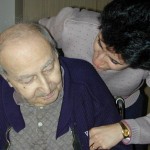Late last year, a longtime caregiver sent me an article entitled, “New Method Predicts Time from Alzheimer’s Onset to Nursing Home, Death.”
The article describes a 10-year study of two groups of patients measured across 16 variables. Despite the number of variables creating limitless result options, the researchers claim they’ve validated the predictive value with even fewer variables.
From a research point of view, such a statement is astounding
considering each patient takes a unique road through Alzheimer’s.
I remain optimistic and await more study results from different researchers.
This initial study by Columbia University Medical Center, used white, educated, higher socioeconomic level participants to clinically validate a new method for predicting time to full-time care, nursing home residence, or death for patients with Alzheimer’s disease.
 I’m curious to see the results from different demographics, for example, people with only a high school education who perhaps have been skilled laborers. Studies show that this population has fewer reserves that delay the decline of Alzheimer’s in those engaged in more challenging cognitive activities. Then again, my father had one year of college and was a skilled laborer yet lived until age 90 after being diagnosed at age 86.
I’m curious to see the results from different demographics, for example, people with only a high school education who perhaps have been skilled laborers. Studies show that this population has fewer reserves that delay the decline of Alzheimer’s in those engaged in more challenging cognitive activities. Then again, my father had one year of college and was a skilled laborer yet lived until age 90 after being diagnosed at age 86.
This initial study took ten years to identify the variables with a specific population. We need to be patient … very patient considering the average lifespan of a person diagnosed with Alzheimer’s is 8 to 20 years.
Paragraph 8 is interesting (click on article link at end of this article): two 68-year old patients have mini mental status scores one number apart, yet subtle differences mean each will progress with Alzheimer’s at different rates.
I expected the media to be all over this, but since its publication three months ago, Google Alerts has sent me one other article about predicting the length of time one is expected to live with Alzheimer’s.
It’s scary to think researchers will be able to predict lifespan with Alzheimer’s this way. On the one hand, it can allow us to better plan for the onset of incontinence, nursing home placement, and even death when caring for a loved one; yet there can be a sinister side to knowing.
And pardon the graphic language, but, we’re screwed once insurers apply these variables to further refine actuarial tables.
[TCV Update 11/4/2019: Link no longer available]to “New Method Predicts Time from Alzheimer’s Onset to Nursing Home, Death.”
Thank you, Mary Barrass for sharing this article.









Brenda,
I read the above article and several of the other related ones. Sorry but they have not turned up anything new. We already know and have known that the average span for AD from diagnosis is 2 to 10 years, with some living longer. Not that many, my proof is in the fact i was in The Alzheimer’s Project by HBO. Memory the loss tapes specifically, we had all been diagnosed is similar time frames, my six friends all died before 10 years was up. The info I have been able to get shows that almost all mentioned in the documentary have passed in the average time frame. But here I still am why, my wife says because I am an sob and just a pain in the ass. We have know about the genes for about 10 or so years, no new break here. These time lines discussed are somewhat ambiguous at best. Studies require large communities of sufferers over long periods of time. Still NO BONIFIED CAUSE (EXCEPT FOR SPECIFIC GENES – LESS THAN 5% OF CASES), NO MEDS THAT REALLY WORK AND OF COURSE NO CURE. 114 years and we are really still at square one, beta amaloyd plauqes. The Sand Piles are only getting deeper for their heads.
God Bless,
Joe
Thank you for giving us hope Joseph that insurers won’t be on top of this anytime soon.
And you do it with such a sense of humor despite walking the front lines with this disease, Joseph.
Again, thank YOU.
Thanks (I think) for posting this article as I did not see the breaking news. You can bet the insurance companies will be all over this one! Next they will be testing us for the gene and declining to insure us if we have it. There are so many in our generation who are able to care for our loved ones here at home. You did it and so did I. But the next generation may not be able to do that. I’m concerned that with all the Baby Boomers entering their senior years, that there will be an onslaught of Alzheimer’s patients. How is this going to be dealt with? Especially if many will not be insured for it? The ACA isn’t going to be of any help. Heck, they want us to die younger.
Interesting comment you made at the end, Carmen. I often wonder whether the Right to Die advocates will gain strength given the rising health care costs and the economic crisis that deflated many retirement portfolios and left college educated young people struggling to make ends meet.
Great, if they are so smart where is the cure?????
WORDS written by a man on the front lines of care. (Thank YOU, Don.)